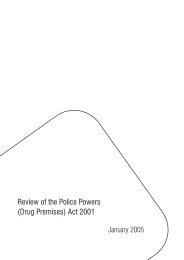Crimes (Forensic Procedures) Act 2000 - NSW Ombudsman - NSW ...
Crimes (Forensic Procedures) Act 2000 - NSW Ombudsman - NSW ...
Crimes (Forensic Procedures) Act 2000 - NSW Ombudsman - NSW ...
Create successful ePaper yourself
Turn your PDF publications into a flip-book with our unique Google optimized e-Paper software.
Recommendation 03<br />
<strong>NSW</strong> Police ensure officers conducting forensic procedures have appropriate training and experience.<br />
In particular, <strong>NSW</strong> Police consider implementing the following reforms.<br />
a. <strong>NSW</strong> Police develop a forensic procedures portfolio in each local area or specialist command, with a<br />
designated and fully trained forensic procedures officer responsible for the portfolio.<br />
b. Individual commands consider developing a small team of officers with forensic procedures expertise who<br />
will primarily be responsible for conducting forensic procedures in those commands.<br />
c. Accreditation for a police officer to conduct any forensic procedure be conditional upon annual training.<br />
In its response to the draft report, <strong>NSW</strong> Police stated that it supports recommendation 3(a) and “will determine the<br />
appropriate area to undertake its implementation.” 294 With regard to recommendation 3(b) which received in principle<br />
support, <strong>NSW</strong> Police agreed that better control and management of forensic procedures is required and advised that<br />
it is assessing methods for improvement in this area.<br />
<strong>NSW</strong> Police did not support recommendation 3(c) and stated that it will review this area to ensure issues concerning<br />
adequate training are addressed. However, <strong>NSW</strong> Police does not believe that annual retraining of police officers in<br />
conducting forensic procedures is appropriate. 295<br />
4.2.7. Posters, quick guides and access to reference material<br />
We were pleased to see that many of the commands we audited kept hardcopies of information sheets to be given<br />
to people undergoing forensic procedures, lists of accredited officers, names of acceptable persons from local<br />
community groups to act as interview friends and instructions on how to conduct forensic procedures. However, the<br />
information at some commands was out of date.<br />
Some commands had put together their own comprehensive forensic procedure information kit, which included<br />
copies of all the relevant SOPs, information sheets, application forms for orders and instructions on how to use video<br />
cameras. Some also included information specific to the command, such as contact details for independent persons<br />
and interview friends. Most commands had dedicated storage areas for all the equipment and police policies relating<br />
to forensic procedures next to or in the testing area. This was fairly standard across the eight commands we audited.<br />
4.2.7.1. Electronic or hardcopy SOPs<br />
Most of the commands we audited kept hardcopies of the SOPs with the rest of their forensic procedures equipment,<br />
although some had only printed out copies of the SOPs most frequently used, usually those for taking buccal swabs<br />
and hair samples from adult suspects.<br />
Representatives from FPIT and the <strong>NSW</strong> Police Audit Group have indicated a preference for police officers to use<br />
electronic rather than hardcopy versions of the SOPs, as this ensures they are always relying on the most complete<br />
and up to date version. Although the SOPs are easily accessible on the FPIT intranet site, many officers prefer a<br />
hardcopy, especially if they need the SOPs in front of them while conducting the procedure (forensic procedures are<br />
usually conducted in an interview room, with no intranet access). We also note that 94 per cent of commands have<br />
printed a hardcopy of the SOPs to keep on hand – so this is clearly what happens in practice. 296<br />
If each command had a designated forensic procedures officer, as we recommend, this person could be responsible<br />
for ensuring the hardcopy SOPs are complete and up to date.<br />
In addition, and so that <strong>NSW</strong> Police supports the preferred practice of its officers, FPIT could establish a hard copy<br />
manual as well as electronic material and provide updates as they occur.<br />
4.2.8. Recording forensic procedures<br />
Most of the problems we identified through our survey and audits stemmed from incomplete or inaccessible records,<br />
rather than the forensic procedures themselves. Indeed, we found records management systems and practices varied<br />
considerably between commands, and sometimes within a single command. This means that officers have to learn<br />
different processes each time they move within the organisation. Not only is this inefficient, it poses a risk to <strong>NSW</strong><br />
48<br />
<strong>NSW</strong> <strong>Ombudsman</strong><br />
DNA sampling and other forensic procedures conducted on suspects and volunteers under the <strong>Crimes</strong> (<strong>Forensic</strong> <strong>Procedures</strong>) <strong>Act</strong> <strong>2000</strong>

















